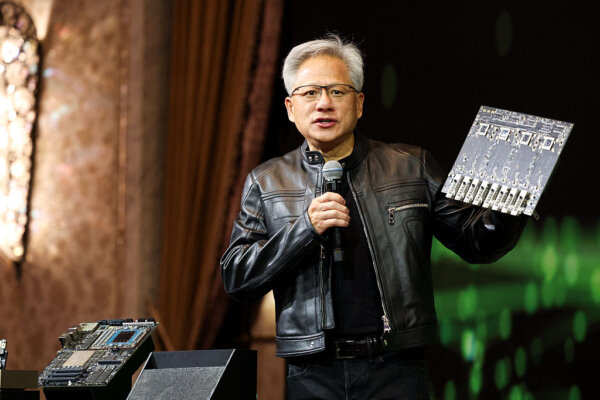![]() Nvidia said on Monday that it expects to resume sales of its H20 graphics processing units to China as the U.S. government has given assurances that it will grant the tech giant’s license applications.
Nvidia said on Monday that it expects to resume sales of its H20 graphics processing units to China as the U.S. government has given assurances that it will grant the tech giant’s license applications.
“The U.S. government has assured NVIDIA that licenses will be granted, and NVIDIA hopes to start deliveries soon,” the company stated in a blogpost on July 14, without specifying any timeline for the deliveries.
Nvidia CEO Jensen Huang first announced the plan to resume H20 chip sales to China during his visit to Beijing earlier this month, where he held meetings with Chinese government and industry officials to discuss ways to advance safe and secure AI.
In Beijing, Huang introduced a new RTX Pro graphics processing unit, which he described as “fully compliant” with regulatory requirements and suitable for digital twin AI applications in smart factories and logistics, the company said.
Prior to his visit to China, Huang met with President Donald Trump and policymakers in Washington to reaffirm Nvidia’s support to maintain America’s global leadership in AI development, boost job creation, and enhance domestic AI infrastructure and onshore manufacturing.
Nvidia stated that Huang’s meetings with U.S. and Chinese officials were aimed at reaffirming the company’s commitment to support open-source research, foundation models, and applications—which it considers vital for positive AI innovation.
“General-purpose, open-source research and foundation models are the backbone of AI innovation,” Huang told reporters in Washington. “We believe that every civil model should run best on the U.S. technology stack, encouraging nations worldwide to choose America.”
The Epoch Times has reached out to the White House for a comment and did not receive a response by publication time.
The company’s AI chips have been a key focus of U.S. export controls, as officials have moved to keep the most advanced chips from being sold to China as the United States tries to ensure national security and keep ahead in the race to AI dominance.
While the H20 chip has a reduced core count, which makes it lower performing, it is still able to deliver some key AI capabilities, including in the domain of inference, the process by which a trained AI model draws conclusions from data it hasn’t encountered before.
That has led to scrutiny that the chip could be used to build supercomputers if gathered in great enough numbers.
“We don’t have to worry about that, because the Chinese military—no different the American military—will not seek each other’s technology out to be built on top of it. They simply can’t rely on it,” Huang said.
“It could be, of course, limited at any time. Not to mention, there’s plenty of computing capacity in China already,” the Nvidia CEO stated. “They don’t need Nvidia’s chips, certainly, or American tech stacks, in order to build their military.”
The equipment under review includes “semiconductor substrates and bare wafers, legacy chips, leading-edge chips, microelectronics, and SME components,” as well as derivative products of those items, according to a notice published in the federal registry.











